Definition: Sales management can be seen as a segment of the organization’s marketing mix. It deals with the formation of sales strategies; product merchandising and pricing; sales promotion activities; distribution function; and planning, staffing, supervising, motivating and controlling of sales personnel to attain the desired sales objectives.
It was initially limited to the guiding, directing and controlling of the sales personnel. But today, it has a significant role in organizational success.
Content: Sales Management
Nature of Sales Management
To understand the concept of sales management clearly, we must go through its following characteristics:
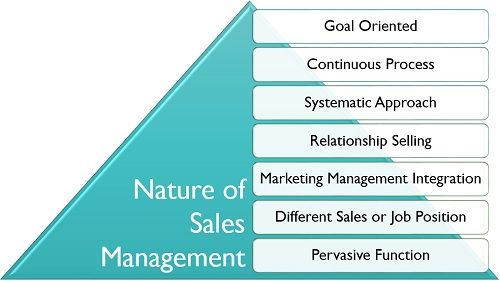
- Goal-Oriented: Similar to other management activities, sales management also have a specific purpose and intended for the achievement of specified goals or objectives.
- Continuous Process: The sales manager needs to perform sales management functions regularly, and this process is never-ending.
- Systematic Approach: It is an organized way of handling the sales function of the company where every problem has a defined and proven solution.
- Relationship Selling: The salespeople make efforts to build a strong customer relationship to sell the products or services effectively.
- Marketing Management Integration: Marketing is a broader concept; marketing management includes all the activities related to sales management.
- Different Sales or Job Position: It is the combined efforts of the whole sales team, including salesperson, sales executive, sales head, sales manager and after-sales service personnel.
- Pervasive Function: It is a universally applicable concept which has been adopted and tested by every kind of business organizations.
Key Aspects
A sales manager needs to concentrate on the three crucial elements of sales management. Getting these three right can bring optimization of the sales management.
Let us now discuss each one of these in detail below:
Sales Operations – Team Building
Building an efficient sales team is the primary focus of a sales manager. He/she needs to ensure that team members are handed over the responsibilities, which matches their skills and knowledge.
Moreover, they have been provided with the required training to execute their duties in the desired manner.
The sales manager then needs to:
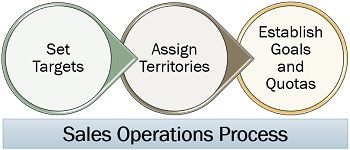
- Determine challenging and realistic sales targets;
- Allot a particular area or territory to each salesperson;
- Set objectives and sales quota for the sales team.
The sales manager have to continually motivate his/her team and provide feedback on their performance.
Sales Strategy – Sales Process
When the team is ready for sales performance, it requires proper guidance and support.
Therefore, the sales manager needs to prepare a sales pipeline which provides a sequential presentation of the steps involved in the sales process, right from lead generation to cracking the deal successfully.
There are varying strategies for different types of sales activities like customer acquisition, customer retention, personal selling, distribution,
A sales funnel or pipeline guides the salespeople and proves to be a useful tool for monitoring and controlling self-performance. The sales manager, however, needs to take charge when the salesperson fails to achieve the desired results.
Sales Analysis – Reporting
Analyzing or reporting the performance of the sales team helps everyone to better-off their tasks and efforts. Thus, it is one of the essential components of sales management.
The team becomes aware of where it stands, by going through the sales metrics, performance index and other quantifiable indicators. Hence, it can find out the loopholes and rectify the mistakes made earlier to ensure optimal results next time.
Using the standard sales pipeline, one can find out the following metrics:
- Number of deals
- The average size of each deal
- The average percentage of deals cracked
- The average time that is taken to close the deals
Sales Management Scope
Sales management is a field which has emerged from marketing management; however, the latter is a broader concept.
Let us now learn about the extent to which sales management is applicable in business organizations:
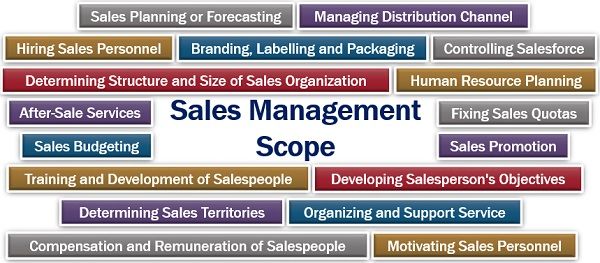
Sales Planning or Forecasting: The sales-related activities need to be planned well in advance through anticipation of future sales prospectives.
Sales Budgeting: The sales manager needs to determine or estimate the sales budget, i.e., the expenses which will be incurred in carrying out the sales activities.
Determining Structure and Size of Sales Organization: The department of a company which is solely responsible for all the sales-related functions is termed as a sales organization.
Sales management provides for determining the size, composition and structure of a sales organization.
Human Resource Planning: The sales management ensures a proper estimation of sales personnel requirement in the organization.
Hiring Sales Personnel: It initiates the recruitment and selection of efficient and suitable candidates for various vacant sales positions.
Training and Development of Salespeople: It also includes providing training and orientation to the selected candidates to develop their skills and knowledge to match those required for the job position.
Developing Salesperson’s Objectives: The sales manager set up achievable objectives or goals for the salespeople appointed under him/her.
Fixing Sales Quotas: Also, the sales quota (monthly, quarterly or yearly) is fixed, either in terms of volume or value of sales to set targets for the sales team.
Determining Sales Territories: Every sales team or salesperson is given a particular region or area as a target market, where they need to penetrate for selling products or services.
Motivating Sales Personnel: It also emphasizes on reviewing the work of salespeople and driving them frequently to perform better.
Compensation and Remuneration of Salespeople: It ascertains appropriate salary, remuneration, allowance, commission and other benefits to the salespeople.
Controlling Salesforce: Exercising sufficient control by monitoring the performance of the sales personnel is also a crucial function of sales management.
Branding, Labelling and Packaging: The sales personnel gathers customer feedback on the acceptability of the product packaging, presentation, branding and labelling.
Managing Distribution Channel: It also ensures keeping track of the marketing channels and filling the loopholes if any.
Sales Promotion: The product advertisements and other promotional tactics are also determined through sales management functions.
Organizing and Support Service: It includes handling of queries and solving problems of the sales personnel through proper guidance and support service.
After-Sale Services: The customer recognizes a company mostly through the effectiveness and efficiency of the after-sale services it provides, which is the concern of sales management.
Importance of Sales Management
Why is sales management considered to be an inevitable part of business organizations?
The following benefits of sales management will enlighten you over the above question:
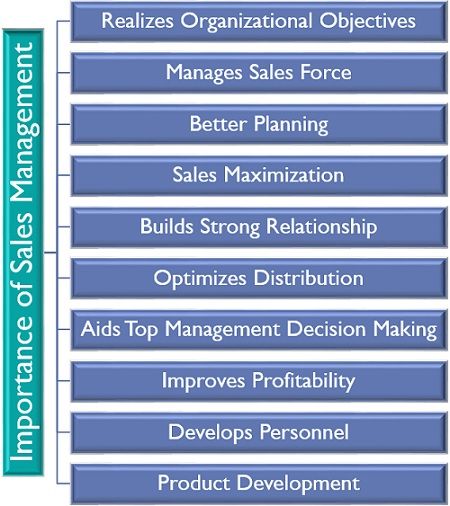
Realizes Organizational Objectives: Sales management is practised to attain the pre-defined organizational goals or objectives which can be increasing profitability, customer satisfaction, market acquisition, and so on.
Manages Sales Force: The sales team includes personnel performing various sales-related tasks; the activities of the sales force are hence monitored and regulated through sales management.
Better Planning: Planning is an essential function of sales management; it includes the formulation of goals, strategies, programmes and budget.
Sales Maximization: It also helps the management in setting sales target, which are though higher than the previous goals but are possibly attainable.
Builds Strong Relationship: The sales personnel emphasizes on building up strong interpersonal relations with the customers, as their primary motive. Since it ultimately drives the sales and profit maximization.
Optimizes Distribution: It provides for maximum utilization of the marketing channels by identifying the key problem areas and finding a solution to these issues.
Aids Top Management Decision Making: It comprises of the comparison between the desired and actual result and thus, supports the top-level management or directors to make crucial decisions (such as business expansion and closure).
Improves Profitability: The most critical concerns of top-level management is profit maximization, which is, therefore, passed on as a primary objective of the sales management.
Develops Personnel: In the process of sales management, the sales personnel is provided sufficient training, growth opportunities and support to ensure their overall development.
Product Development: The sales team are in constant touch with the clients or customers, which helps the management to know about their preference and taste.
Thus, leading to new product development or improving the existing products or services.
Conclusion
Sales management is a vital part of any business organization. It not only makes the products or services available to the customers but also supports the organization to sustain competition in the long run.
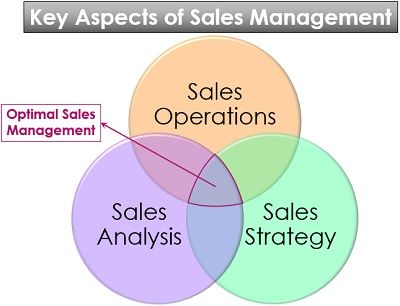
Ivan says
Great info. Lucky me I found your website by chance (stumbleupon). I have bookmarked it for later!
Peter mboje samike says
I’realy happy and enjoyed the notes, they are so related to what I’m expect, thank you so much.
Mohammed Imran says
I have understand the concept of marketing management, sales analyst, etc..
This is good knowledge for me, when piching sales our products….
Prasanna Kumar m says
It’s good one to learn and adopt in our career for growth